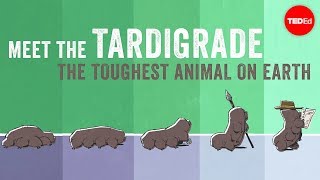(单词翻译:单击)
Without water, a human can only survive for about 100 hours.
如果没有水,人类只能存活一百小时左右。
But there's a creature so resilient that it can go without it for decades.
但是有一种适应力极强的生物可以在没有水的情况下生存几十年。
This one millimeter animal can survive both the hottest and coldest environments on Earth,
这种长仅一毫米的动物可以在地球上最热以及最冷的环境下生存,
and can even withstand high levels of radiation.
甚至能够承受高剂量的辐射。
This is the tardigrade, and it's one of the toughest creatures on Earth,
这就是缓步动物,它是地球上生命力最强的生物之一,
even if it does look more like a chubby, eight-legged gummy bear.
即使它看着更像是一个胖胖的八脚小熊。
Most organisms need water to survive.
大部分的有机体依靠水来生存。
Water allows metabolism to occur, which is the process that drives all the biochemical reactions that take place in cells.
水使得新陈代谢得以进行,而新陈代谢则驱动着一切细胞中的生化反应。
But creatures like the tardigrade, also known as the water bear,
但是缓步动物,也称水熊虫,
get around this restriction with a process called anhydrobiosis, from the Greek meaning life without water.
可以通过低湿隐生,即在没有水的情况下生存,从而避免新陈代谢需要水这一限制。
And however extraordinary, tardigrades aren't alone.
而并不只有水熊虫拥有这项超凡的本领。
Bacteria, single-celled organisms called archaea, plants, and even other animals can all survive drying up.
细菌,被称为古细菌的单细胞生物,植物,甚至其他动物都可以脱水生活。
For many tardigrades, this requires that they go through something called a tun state.
对于很多水熊虫来说,脱水需要经历“小桶状态”。
They curl up into a ball, pulling their head and eight legs inside their body and wait until water returns.
它们卷曲成一个小球,使自己的头和八只脚缩进身体里,以这种状态等待水的到来。
It's thought that as water becomes scarce and tardigrades enter their tun state,
一般认为,当环境中的水变得稀缺时,水熊虫即进入“小桶状态”,
they start synthesize special molecules, which fill the tardigrade's cells to replace lost water by forming a matrix.
它们开始合成特殊的分子,这种分子可以形成一种基体充满水熊虫的细胞,从而代替失去的水。
Components of the cells that are sensitive to dryness, like DNA, proteins, and membranes, get trapped in this matrix.
那些对干燥比较敏感的细胞组成部分,如DNA,蛋白质,细胞膜,都会被固定在基体中。
It's thought that this keeps these molecules locked in position to stop them from unfolding, breaking apart, or fusing together.
普遍认为,这可以使这些分子保持在原位,从而使它们不会展开、碎裂或是混合在一起。
Once the organism is rehydrated, the matrix dissolves, leaving behind undamaged, functional cells.
一旦有机体获得水,基体就会溶解,而细胞不会受到损害,功能完好。

Beyond dryness, tardigrades can also tolerate other extreme stresses:
除了干旱,水熊虫还可以忍受其他极端条件:
being frozen, heated up past the boiling point of water, high levels of radiation, and even the vacuum of outer space.
冷冻,沸水加热,高强度辐射,甚至是外太空的真空环境。
This has led to some erroneous speculation that tardigrades are extraterrestrial beings.
这引发了一些错误的推测,例如水熊虫是外星生物。
While that's fun to think about, scientific evidence places their origin firmly on Earth where they've evolved over time.
虽然这听上去很有趣,但是科学证实它们确实起源于地球,并且在地球上进化。
In fact, this earthly evolution has given rise to over 1100 known species of tardigrades
事实上,在地球上的这一进化过程演化出了1100种以上水熊虫,
and there are probably many others yet to be discovered.
但是很可能还有众多其他种类尚待发现。
And because tardigrades are so hardy, they exist just about everywhere.
由于缓步动物如此坚强,它们能够存在于任何地方。
They live on every continent, including Antarctica.
包括南极洲在内的五大洲都有它们的身影。
And they're in diverse biomes including deserts, ice sheets, the sea, fresh water, rainforests, and the highest mountain peaks.
它们生活在不同的生物群落中,包括沙漠,冰川,海洋,淡水,雨林以及世界最高峰。
But you can find tardigrades in the most ordinary places, too, like moss or lichen found in yards, parks, and forests.
你也可以在最普通的地方找到它们,比如在花园、公园、森林中的苔藓或地衣。
All you need to find them is a little patience and a microscope.
你只需要一些耐心和一个放大镜就能找到它们。
Scientists are now to trying to find out
科学家们现在正在努力弄清
whether tardigrades use the tun state, their anti-drying technique, to survive other stresses.
水熊虫是否能够通过“小桶状态”和反干旱技能在其他严酷条件下生存。
If we can understand how they, and other creatures, stabilize their sensitive biological molecules,
如果我们能明白它们和其他生物如何使敏感的生物分子保持稳定状态,
perhaps we could apply this knowledge to help us stabilize vaccines,
我们也许就可以将其用于稳定疫苗,
or to develop stress-tolerant crops that can cope with Earth's changing climate.
或者是发展能够应对全球气候变化的农作物。
And by studying how tardigrades survive prolonged exposure to the vacuum of outer space,
通过研究水熊虫如何在外太空的真空环境下延长存活时间,
scientists can generate clues about the environmental limits of life and how to safeguard astronauts.
科学家可以找出生命在环境中的极限以及如何保护宇航员。
In the process, tardigrades could even help us answer a critical question:
在研究中,水熊虫甚至可以帮我们回答一个重要问题:
could life survive on planets much less hospitable than our own?
生命是否能够在比地球环境更恶劣的星球上存活?


